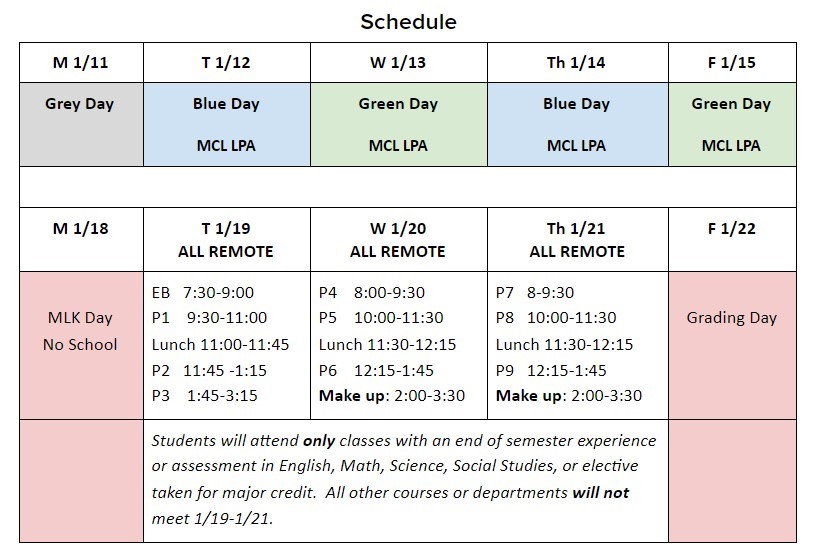First semester exams look more like tests than finals
Students taking fewer cumulative exams this week
New Trier Website
Finals week divided up as a nine-period day. Students will attend classes with exams on their respective days.
Because of the new block schedule and hybrid learning, many students are finding their semester exams will look different than in previous years.
Semester exams, which take place from Jan. 19-21, will all be held remotely this year. A typical nine-period school day will be divided throughout the shortened week, with students attending only their classes with exams.
Junior Lierin Peterson says that in general, her semester exams have changed a lot this year.
“For APUSH I have a DBQ that won’t change my grade– it can only help me, for math I have a unit test, for Spanish we have the LPA because that’s what we have every year, and for English we just have a reflection that’s worth 20 points,” she said.
Peterson’s biology final is the only cumulative exam she has this semester.
“Our biology final is just like the final would be in any regular year, it’s 70 multiple choice questions in an hour and it covers all of the units. Pretty much all of our tests have been forty-minute versions of this- they’re all multiple choice and on Canvas.”
Peterson says that the testing process in general has been really difficult for students this semester.
“I think that my teachers have really struggled to find a format where you can still do well but also it’s hard to cheat. For example in my biology class, for all of our tests, we have a system where once you answer a question you can’t see it again,” said Peterson.
Junior Andrew Gill says he has a cumulative biology final also, as well as an American Studies essay and a math test during his math period’s time slot. He says only having one cumulative final has taken some of the stress off, but he’s nervous about it being online.
“I’m not too concerned because [biology] is the only true final that I have. I am a little cautious because when we did LPAs last week there were some kids who had technical difficulties. I know that there’s always one kid who’s going to have some sort of submission error or something, but I think as long as teachers are considerate of that, it’s not too difficult this year,” said Gill.
Though exams look different, teachers have still found ways to focus on what they think is important.
Keely Burns, who teaches 3-level Algebra 2 and AP Calculus BC, says that the review process is an important part of the exam experience and she wanted students to have that opportunity this year as well.
“Usually with Algebra 2, we’ll probably spend at least four days going through a review packet, starting with what we did in Unit 1 early in the year and then making our way through the most recent stuff. I really try to put a lot of it on them to do the review so I’ll highlight some things in class and then give them a chance to ask their own questions,” said Burns.
Burns usually has her Algebra 2 students take a ninety minute final with a calculator and a non-calculator section worth 20% of a student’s grade if it helps them and 15% if it doesn’t. This year, however, they won’t be taking an exam at all, but they will still go through the review process.
“We’re still going to go through the review process because there’s obviously still value in all of that even if they’re not taking a traditional final,” said Burns.
For her Calculus class, Burns has a different plan.
“Calculus is a little different because there’s so much material, so we usually only have a couple of days at the end of the semester to review, and we’re learning a lot of new stuff right up until then. So I don’t know that it looks a lot different than it has in the past years, but we’re not taking our traditional final for that class either. I think that what we’re going to do is give our last chapter test of the semester during that time, but I’m still working out all the details,” said Burns.
The LPAs have been different this year for many students as well, but teachers have still found ways to test their students’ language skills.
Spanish teacher Tonya Piscitello, who teaches Spanish 2 levels 3 and 4, says that other than not being able to assess speaking, the parts of the LPA are relatively the same as last year.
“Last year, students did listening, reading, and writing for their LPAs. This year with the global health crisis, we need to think about what’s important… I’ve found myself being creative in assessments,” said Piscitello.
Piscitello used to have students keep a journal with daily entries of cultural items from the Spanish-speaking world. This year, she instead has had students write a reflection of the culture that they have learned this year.
“There isn’t a correct answer- the focus is on students being able to show their learning experience,” said Piscitello.








































